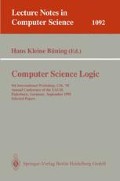Abstract
A domain theoretic denotational model is given for a simple sublanguage of CCS extended with divergence operator. The model is derived as an abstraction on a suitable notion of normal forms for labelled transition systems. It is shown to be fully abstract with respect to observational precongruence.
Partly supported by an EC Human Capital and Mobility Grant
Preview
Unable to display preview. Download preview PDF.
References
S. Abramsky. A domain equation for bisimulation. Information and Computation, 92:161–218, 1991.
L. Aceto and M. Hennessy. Termination, deadlock and divergence. Journal of the ACM, 39(1):147–187, January 1992.
S. Abramsky and A. Jung. Domain theory. In Handbook of Logic in Computer Science. Oxford University Press, 1994.
I. Guessarian. Algebraic Semantics, volume 99 of Lecture Notes in Computer Science. Springer-Verlag, 1981.
M. Hennessy. A term model for synchronous processes. Information and Computation, 51(1):58–75, 1981.
M. Hennessy. Acceptance trees. Journal of the ACM, 32(4):896–928, 1985.
M. Hennessy. Algebraic Theory of Processes. MIT Press, Cambridge, Massachusetts, 1988.
M. Hennessy. Axiomatising finite concurrent processes. SIAM Journal on Computing, 17(5):997–1017, 1988.
R.M. Keller. Formal verification of parallel programs. Communications of the ACM, 19(7):371–384, 1976.
R. Milner. A Calculus of Communicating Systems, volume 92 of Lecture Notes in Computer Science. Springer-Verlag, 1980.
R. Milner. Modal characterisation of observable machine behaviour. In G. Astesiano and C. Bohm, editors, Proceedings CAAP 81, volume 112 of Lecture Notes in Computer Science, pages 25–34. Springer-Verlag, 1981.
R. Milner. Calculi for synchrony and asynchrony. Theoretical Computer Science, 25:267–310, 1983.
R. Milner. Communication and Concurrency. Prentice-Hall International, Englewood Cliffs, 1989.
D.M.R, Park. Concurrency and automata on infinite sequences. In P. Deussen, editor, 5th GI Conference, volume 104 of Lecture Notes in Computer Science, pages 167–183. Springer-Verlag, 1981.
G.D. Plotkin. Lecture notes in domain theory, 1981. University of Edinburgh.
D.S. Scott and C. Strachey. Towards a mathematical semantics for computer languages. In Proceedings of the Symposium on Computers and Automata, volume 21 of Microwave Research Institute Symposia Series, 1971.
C. Stirling. Modal logics for communicating systems. Theoretical Computer Science, 49:311–347, 1987.
D.J. Walker. Bisimulation and divergence. Information and Computation, 85(2):202–241, 1990.
Author information
Authors and Affiliations
Editor information
Rights and permissions
Copyright information
© 1996 Springer-Verlag Berlin Heidelberg
About this paper
Cite this paper
Ingólfsdóttir, A., Schalk, A. (1996). A fully abstract denotational model for observational precongruence. In: Kleine Büning, H. (eds) Computer Science Logic. CSL 1995. Lecture Notes in Computer Science, vol 1092. Springer, Berlin, Heidelberg. https://doi.org/10.1007/3-540-61377-3_47
Download citation
DOI: https://doi.org/10.1007/3-540-61377-3_47
Published:
Publisher Name: Springer, Berlin, Heidelberg
Print ISBN: 978-3-540-61377-0
Online ISBN: 978-3-540-68507-4
eBook Packages: Springer Book Archive

